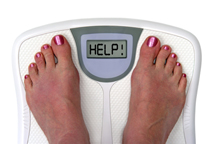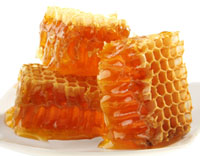Nutrition and Diet Myths
Table of Contents
Below are some nutritional myths that we hear often. Sometimes things are repeated so much that we're inclined to believe they are true, but beware! If a claim isn't backed up by scientific evidence you should take it with a grain of salt and do your homework to verify what you've heard or read.
1. You Can Lose 30 lbs in Just 10 Days! Errr… No You Can't
2. Eating Fats Is Bad for You
3. Lose Weight By Drinking Vinegar
4. Negative Energy Foods
5. Honey is Better than Sugar
6. Sugar Causes Diabetes
7. Skipping Meals is an Easy Way to Lose Weight
8. Being Vegetarian is Healthier
1.You Can Lose 30 lbs in Just 10 Days! Errr… No You Can't
There isn't one of us that doesn't wish such claims were true. The sad reality is that you can be certain of 3 things:

- Whatever you lose will not be fat
- Losses will be very temporary and you may gain more weight afterwards
- Sudden and dramatic losses are very unhealthy
Think of it mathematically. It's not physically possible to burn off 30 lbs in one week even if you were running 24 hours a day for the entire 10 days. And that's true even if you didn't eat a single thing.
So how do companies get away with making these sorts of claims? Simple. They're not based on permanent fat loss. Instead, they rely on:
- Severe water loss which is dangerous, and also results in muscle loss
- Severe loss of glycogen (stored energy in the muscles and liver) – which will make you feel miserable
- Totally flushing out the intestinal track (which can damage the natural digestive ability)
Permanently losing fat takes time. No one becomes overweight overnight, so it isn't fair to expect to become thin quickly.
2.Eating Fats Is Bad for You
This commonly held belief likely came from the fear of developing high cholesterol and from the fear of weight gain. And while partially true, the statement on its own doesn't tell the whole story. It is true that there are some fats that should only be consumed in extremely small quantities, there are other fats that are extremely useful for the body and play important metabolic functions. In addition, fat does not cause the insulin fluctuations that is observed when consuming carbohydrates.
Strangely, despite an effort by many over the last few years to reduce their fat intake, North Americans as a whole have actually become even more overweight. One of those things that makes you say, “hmmmm… .”
3.Lose Weight By Drinking Vinegar
Ah vinegar. There seems to be no other household product that seems to have as many uses. Alas, there is no magic weight loss characteristic in vinegar. Sure, a little in your diet may make a salad easier to eat, but there is absolutely no proof that drinking it in large quantities will reduce your weight in a meaningful way.
4.Negative Energy Foods
The basic idea here is that some foods provide less calories than they take your body to digest them. The most popular food used with such claims is celery. While it is true that celery has very few calories, it also requires very few calories to digest. In fact, celery being mostly fiber, doesn't digest well at all.
Again, from a mathematical perspective, you would need to eat a whole lot of celery to have any noticeable benefit. And at the same time you wouldn't be able to supplement your caloric intake with other foods. For how many days do you think you can eat bundles of celery sticks before you gave in and had something that tasted better? Other similar claims may include foods like grapefruit and cabbage which are often labeled as ‘fat burners.' Food can't, under any circumstances, burn fat.
5.Honey is Better than Sugar

There is very little evidence to support that honey has any more nutrients than sugar. And, both have a similar glycemic index and similar calorie counts. Bottom line, they are both a type of sugar, and should be consumed in moderation.
6.Sugar Causes Diabetes
No one knows the true cause of type 1 diabetes. In fact, in many cases it happens very early in life, before we have time to do any damage to our bodies by the foods we eat. Type 2 diabetes is related to being sedentary and overweight along with poor eating habits. Yet there is little evidence to suggest that eating sugar will directly lead to type 2 diabetes. However, eating too much sugar will lead to too many calories, which can lead to obesity. More research is needed on this one.
7.Skipping Meals is an Easy Way to Lose Weight
This seems intuitively true and most of us have probably tried it, but in practice it doesn't work. The main reason is we quickly make up the missed meal by either snacking in between meals or eating more at the next couple of meals. Skipping a meal simply results in a greater appetite by the time we finally do sit down to eat. This has been proven with many studies.
8.Being Vegetarian is Healthier
The reasons one may choose to become a vegetarian can vary as can the type of vegetarianism. However, ensuring that you obtain the necessary nutrition as a vegetarian requires a lot of research and meal planning, especially if you are going to avoid all animal products. The reason for this is that we get many nutrients from animal products that are, at best, are only available in small quantities in vegetable matter. Also, be aware the just because one is a vegetarian, does not mean they don't eat junk food. All it means is that they don't eat meat. If they have donuts for breakfast, chips for lunch, and french fries for dinner, how healthy do you think they will be?




Leave a Reply